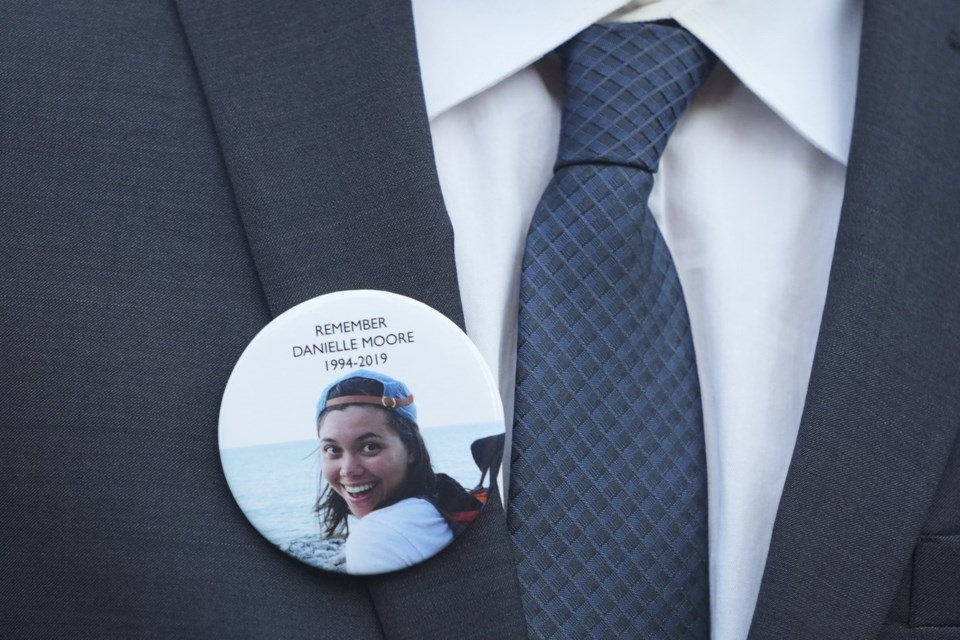DALLAS (AP) — Families of some of the 346 people killed in crashes of Boeing 737 Max jetliners held photos of their dead loved ones Wednesday outside a federal court in Texas, where a judge is hearing arguments on the U.S. government's motion to dismiss a felony conspiracy charge against the aerospace company in connection with the twin disasters.
U.S. District Chief Judge Reed O’Connor set aside time for relatives of the crash victims to speak during the hearing. Some travelled from Canada, as well as countries in Europe and Africa, to pursue what could be their final opportunity to demand that the company face criminal prosecution for the crashes off the coast of Indonesia and in Ethiopia.
Chris and Clariss Moore of Toronto, whose 24-year-old daughter, Danielle, died when a 737 Max crashed shortly after takeoff from Ethiopia’s Addis Ababa Bole International Airport, said in a statement that a pending agreement would allow Boeing to escape justice.
“The safety of passengers will be held in the balance,” the statement said.
In charging Boeing with conspiracy to defraud the government, prosecutors alleged Boeing deceived Federal Aviation Administration regulators about a flight-control system that was later implicated in the fatal flights, which happened less than five months apart in 2018 and 2019.
The hearing in Fort Worth comes more than four years after the Justice Department announced it had charged Boeing and reached a $2.5 billion settlement with the aircraft maker. That deal would have protected Boeing from criminal prosecution if it strengthened its ethics and legal compliance programs. Prosecutors revived the charge last year after deciding the company had violated certain terms of the agreement.
Boeing decided to plead guilty as part of a new agreement, but O’Connor rejected the deal in December. O'Connor, who was appointed by President George W. Bush, cited concerns he had over how diversity policies both at the federal government and at Boeing could influence the selection of an independent monitor charged with overseeing the company's promised reforms.
The judge’s refusal to accept the plea agreement meant the company was free to challenge the Justice Department’s rationale for charging Boeing as a corporation. It also meant prosecutors would have to secure a new deal for a guilty plea, and they spent six months renegotiating with Boeing.
In late May, the two sides struck a non-prosecution agreement that took both the criminal charge and Boeing's guilty plea off the table. In exchange, Boeing said it would pay or invest another $1.1 billion in fines, compensation for the crash victims’ families, and internal safety and quality measures.
The Justice Department said it offered those terms in light of “significant changes” Boeing has made to its quality control and anti-fraud programs since last summer. It said the certainty of the agreement also served the public interest more effectively than taking the long-running case to trial and risking a jury verdict that might spare the company further punishment.
“My daughter died on a new airplane that was defective and that was in operation because they weren’t complying with regulations and because of fraud,” said Nadia Milleron, a Massachusetts resident whose 24-year-old daughter, Samya Stumo, was among the 157 passengers and crew members killed in the Ethiopia crash. “I don’t want any other any other family member to lose their loved ones because of this kind of fraud.”
Nearly 100 families oppose the agreement and want the judge to appoint a special prosecutor to take over the case since the Justice Department said it would not move forward with the charge even if O'Connor refuses to dismiss it, according to court documents.
Justice Department lawyers said the families of 110 crash victims either support resolving the case before it reaches trial or do not oppose the new deal. The Justice Department has asked the judge to leave open the possibility of refiling the conspiracy charge if the company does not hold up its end of the deal over the next two years.
While federal judges typically defer to the discretion of prosecutors in such situations, court approval is not automatic.
The yearslong case centers around a software system that Boeing developed for the Max, which began flying in 2017.
In the 2018 and 2019 crashes, that software pitched the nose of the plane down repeatedly based on faulty readings from a single sensor, and pilots flying then-new planes for Lion Air and Ethiopian Airlines were unable to regain control. After the Ethiopia crash, the planes were grounded worldwide for 20 months while the company redesigned the software.
Investigators found that Boeing did not inform key Federal Aviation Administration personnel about changes it had made to the software before regulators set pilot training requirements for the Max and certified the airliner for flight.
Acting on the incomplete information, prosecutors said, the FAA approved minimal, computer-based training for Boeing 737 pilots, avoiding the need for flight simulators that would have made it more expensive for airlines to adopt the latest version of the jetliner.
The initial 2021 settlement agreement was on the verge of expiring last year when a panel covering an unused emergency exit blew off a 737 Max during an Alaska Airlines flight over Oregon. No one was seriously injured, but it put Boeing’s safety record under renewed scrutiny.
Jamie Stengle And Rio Yamat, The Associated Press



